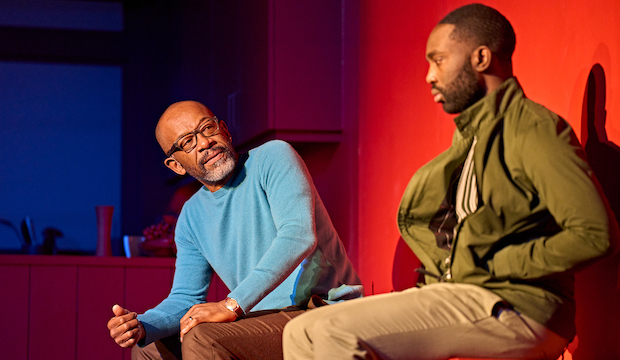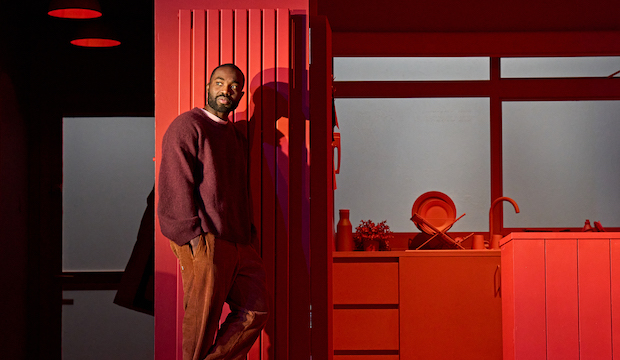A Number, Old Vic Theatre review ★★★★★
Screen stars Lennie James and Paapa Essiedu breathe fresh life into A Number, Caryl Churchill’s clone-fuelled father-son drama, at the Old Vic
Lennie James and Paapa Essiedu in A Number at The Old Vic. Photo: Manuel Harlan
When the great Caryl Churchill’s pacy play about cloning and a failed father-and-son relationship first hit the stage, the year was 2002, a time when Dolly the cloned sheep was alive and reports of a cloned human baby, Eve, were in the headlines.
Twenty years on and while the technology to clone humans presumably exists in laboratories, concerns over the ethics of the practice have prevented it becoming a reality. As a result, A Number remains an eerily futuristic and dystopian watch today, and it’s currently showing at Old Vic Theatre in a production directed by Churchill connoisseur Lyndsey Turner (Top Girls, Light Shining in Buckinghamshire, Far Away).
Screen star Lennie James (The Walking Dead) plays Salter, and Paapa Essiedu (I May Destroy You) his sons Bernard 1 and 2, and the illegally created clone, Michael Black.

Lennie James and Paapa Essiedu in A Number at The Old Vic. Photo: Manuel Harlan
Through agonising conversations between Salter and his sons, we learn that the troubled father cloned the original Bernard for the chance to bring him up again, without his past parental mistakes. Despite Salter's claims he did so because Bernard was perfect, blameless and irreplaceable, both sons are understandably disturbed and furious at having been robbed of their originality.
The sons raise other grievances about their upbringings too, and in Churchill’s signature style – with questions left unfinished and sentences interrupted – we, the audience, are given the freedom to colour in the picture with our own interpretations.
James delivers a moving performance as Salter. He’s pleading, flattering and desperate to make amends. Turner’s Bernards and Michael Black are visually distinguishable by their different outfits, but they needn’t be: Essiedu is strikingly different in each role, from the underconfident, bouncy Bernard 2 to the melancholy, streetwise original and upright, happy-go-lucky Michael.

A Number at The Old Vic. Photo: Manuel Harlan
The set, by lauded designer ES Devlin (Forest for Change), appears like an open-sided Tardis that has crash-landed onto the Old Vic stage. Perched on top of its natural surroundings, the box-like set opens onto a kitchen-dining room set-up, with everything from houseplants to kitchenware bathed in a sinewy pink. While stripping the home’s contents of any individuality neatly mirrors the play’s theme, the stage-within-a-stage structure distances us from the drama, making it harder to warm to the characters or their predicament, initially.
James and Essiedu’s performances cut through this though and, in the final scene, where nature versus nurture is explored and the play’s gut-punching message hits home, watching Salter scan Michael in a desperate attempt to find resemblance is shattering.
Twenty years on and while the technology to clone humans presumably exists in laboratories, concerns over the ethics of the practice have prevented it becoming a reality. As a result, A Number remains an eerily futuristic and dystopian watch today, and it’s currently showing at Old Vic Theatre in a production directed by Churchill connoisseur Lyndsey Turner (Top Girls, Light Shining in Buckinghamshire, Far Away).
Screen star Lennie James (The Walking Dead) plays Salter, and Paapa Essiedu (I May Destroy You) his sons Bernard 1 and 2, and the illegally created clone, Michael Black.

Lennie James and Paapa Essiedu in A Number at The Old Vic. Photo: Manuel Harlan
Through agonising conversations between Salter and his sons, we learn that the troubled father cloned the original Bernard for the chance to bring him up again, without his past parental mistakes. Despite Salter's claims he did so because Bernard was perfect, blameless and irreplaceable, both sons are understandably disturbed and furious at having been robbed of their originality.
The sons raise other grievances about their upbringings too, and in Churchill’s signature style – with questions left unfinished and sentences interrupted – we, the audience, are given the freedom to colour in the picture with our own interpretations.
James delivers a moving performance as Salter. He’s pleading, flattering and desperate to make amends. Turner’s Bernards and Michael Black are visually distinguishable by their different outfits, but they needn’t be: Essiedu is strikingly different in each role, from the underconfident, bouncy Bernard 2 to the melancholy, streetwise original and upright, happy-go-lucky Michael.

A Number at The Old Vic. Photo: Manuel Harlan
The set, by lauded designer ES Devlin (Forest for Change), appears like an open-sided Tardis that has crash-landed onto the Old Vic stage. Perched on top of its natural surroundings, the box-like set opens onto a kitchen-dining room set-up, with everything from houseplants to kitchenware bathed in a sinewy pink. While stripping the home’s contents of any individuality neatly mirrors the play’s theme, the stage-within-a-stage structure distances us from the drama, making it harder to warm to the characters or their predicament, initially.
James and Essiedu’s performances cut through this though and, in the final scene, where nature versus nurture is explored and the play’s gut-punching message hits home, watching Salter scan Michael in a desperate attempt to find resemblance is shattering.
TRY CULTURE WHISPER
Receive free tickets & insider tips to unlock the best of London — direct to your inbox
| What | A Number, Old Vic Theatre review |
| Where | The Old Vic, The Cut, London, SE1 8NB | MAP |
| Nearest tube | Waterloo (underground) |
| When |
24 Jan 22 – 19 Mar 22, 7:30 PM – 8:40 PM |
| Price | £10 - £65 |
| Website | Click here for more information and to book |